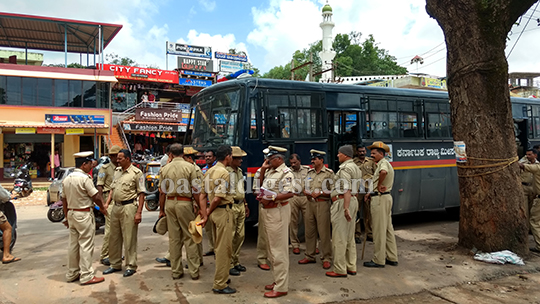Mangaluru, Jun 18: Accusing Dakshina Kannada district police of being communally biased against Muslims, Social Democratic Party of India has said that several innocent Muslims have been targeted by the cops in the wake of recent communal disturbances in Kalladka town of Bantwal taluk.

Addressing a press conference at BC Road, near here, Ashraf Manchi, district secretary of SDPI, said the cases booked against the accused belonging to Muslim and Hindu communities in the aftermath of June 13 clash exposed the communal mindset of the police.
“Police have registered 10 cases in connection with Kalladka clash. However, they have registered complaints against 82 persons from Muslim community and only against 19 persons from Hindu community,” he said.
He said that though police have arrested nine persons each from Hindu and Muslim communities, Muslims have been slapped with cases under IPC Section 307 (attempt to murder), while most of the arrested Hindus have been slapped minor cases under weaker Sections like 324. “32 Muslims have been booked under Section 304, while only 4 members of the Sangh Parivar, which is mainly responsible for the incident have been booked under the same Section,” he lamented.
He said that activists of the Sangh Parivar had pelted stones on the Masjid and Madrasa from atop a building owned by Kalladka Prabhakar Bhat. “The president of the Masjid, Abubakar Haji, has informed the police regarding the damage caused. However, they have not registered case against any of the accused in the incident. Ironically, complaint has been registered against 30 Muslims on charge of pelting stones at a Sri Rama temple,” he said.
Mr Manchi also accused the police of committing atrocities against Muslims. “Bantwal Circle Inspector B K Manjayya and Bantwal town police station SI Rakshit A K, along with a team with no women police entered the houses of innocent Muslims late at night and committed atrocities against family members irrespective of women, elderly people and sick. The police also damaged the doors and windows of the Muslim houses during midnight raids. The shocked women have been admitted to a hospital in Mangaluru, but the police are not ready to take the statements of the victims,” he complained.
“In fact stones were pelted at SI A K Rakshit when he was trying to disperse the violent crowd near the Sri Rama Vidyakendra after dispersing crowd in front of the mosque. In this case police have named 23 accused. Ironically all of them are Muslims and they were also booked under Section 307,” said Munish Ali, a local SDPI leader and member of Bantwal Town Municipal Council.
Calling Kalladka clash as a pre-planned conspiracy of Sangh Parivar, he said that the government had completely failed in thwarting the plot of the communal outfits. “Their intention was to create a major communal riot. Had the district administration and police department taken enough precautionary measures after two innocent Muslim youths were stabbed on May 26 by Sangh Parivar activists, this wouldn’t have happed,” he said accusing both Congress and BJP of resorting to vote bank politics.
Police targeting innocent Hindus, says MP
Meanwhile Dakshina Kannada MP Nalin Kumar Kateel has accused the police of arresting innocent Hindus due to political pressure. “Both police department and communal mafia trying to suppress Hindu power and Hindu sentiments,” he told media persons in Puttur.
He said that the police department has become a mere puppet in the hands of the politicians in Congress ruled Karnataka. “The hands of able and efficient police officers have been tied. Even though miscreants of other communities are harassing Hindus, police are arresting innocent Hindus for the sake of head count,” he lamented.
He went on to claim that the police invoked the Goonda Act against innocent Hindu youths in order to create fear among Hindu society, while the real culprits are roaming free.
He said that BJP will extend full support to the protest scheduled to be organized by Hindu Jaagarana Vedike on June 24 at Kalladka. He said that BJP state president B S Yeddyurappa will also take part in the protest.





Comments
Wake up Mr. Khader, Bawa and Siddharamayya....
Else give your seat to others in next election.
Mr.MP we remember very well your statement on Karthik Raj murder case , and that proved you are unfit for this post and when real culprit got caught you disappeared with shobakaaaa ( one more unfit )
Add new comment